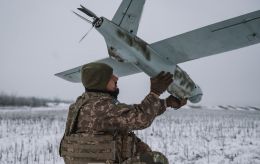U.S. State Department rep Daniel Cisek: 'Europe has done a lot for Ukraine, but can do more'
 Daniel Cisek, U.S. State Department official representative (Photo: video screenshot twitter.com/USApoRusski)
Daniel Cisek, U.S. State Department official representative (Photo: video screenshot twitter.com/USApoRusski)
In an interview with RBC-Ukraine, Daniel Cisek, the official representative of the U.S. State Department, provided insights on whether U.S. aid depends on the Ukrainian counteroffensive, the impact of the U.S. presidential campaign, the war in Israel, and the role of the European Union in supporting Ukraine.
On December 4, the White House warned congressional leaders in a letter that if a new aid package for Ukraine is not approved by the end of the year, the U.S. will no longer be able to supply weapons to Ukraine. The letter stated, "We have run out of money, and time is running out."
Different forecasts circulate within Congress about when and how a new multibillion-dollar aid package for Ukraine could be approved. Daniel Cisek, the official representative of the U.S. State Department, who spoke with RBC-Ukraine after the NATO Foreign Ministers' Summit in Brussels last week, refrained from making predictions but did not rule out the possibility that the aid package could be approved shortly. Additionally, Cisek emphasized several times in the conversation that the European Union is essential in aiding Ukraine, but the U.S. believes that Europeans could do more.
How does the U.S. generally assess the current situation on the front line? And do you not think that expectations of our counteroffensive were overheated?
Regarding the counteroffensive, Ukraine has reclaimed territory and opened sea routes. This is a significant achievement. Ukrainian forces have acted very bravely. The U.S. government understands that the counteroffensive was difficult, and defense is always more accessible. However, the U.S. government plans to continue supporting Ukraine.
Regarding the situation on the front line now, I would say that there are ongoing contacts between the U.S. and Ukrainian governments. Our country receives information about what is happening directly from President Zelensky, and we understand that this is a difficult situation. However, the U.S. government believes that Ukraine's Armed Forces have already demonstrated their capabilities. Now, it is necessary to think about what comes next.
The results of the counteroffensive, whether its success or failure, can somehow affect the level of military support for Ukraine from the United States?
The counteroffensive should not affect the level or quantity of support for Ukraine by the United States. What do we know now? President Biden has submitted a request to the U.S. Congress for an additional $61 billion in military aid to Ukraine, which is currently being discussed in Congress.
Bipartisan support for Ukraine is maintained in the U.S. Congress. President Biden is actively working with Republicans and Democrats in Congress on this matter. The Biden administration expects Congress to approve a new aid package for Ukraine.
Is there a chance that this will happen already this year?
It is impossible to predict the future precisely, but President Biden is now requesting this aid. And yes, it may happen shortly.
The situation in Israel has shifted attention away from Ukraine, including the United States. But isn't there fatigue from us in the American establishment? And if not, why is the support objectively not as intensive as before, and the situation in Congress confirms this: previously, everything went more smoothly than it does now?
The situation in the Middle East is dire, and yes, the U.S. supports Israel. But the U.S. has the resources to support both Ukraine and Israel simultaneously, and it is crucial to note this. Despite the delay in approving a new aid package for Ukraine, the U.S., as before, can support Ukraine. Of course, the issue is being discussed in Congress. The U.S. government has already provided Ukraine with many mighty weapons for self-defense, and the American people are very supportive of this.
Naturally, the issue is being discussed in Congress, and everyone has the opportunity to express their opinion, but President Biden and his administration clearly state that this assistance is needed now.
Should Ukrainians be concerned that Washington will be less focused on Ukraine during the upcoming U.S. election campaign, which will enter its full phase next year?
It's understandable, and naturally, people in Ukraine follow events in the U.S. very closely, as many Americans do the same. It's a hypothetical question about how the campaign can influence the situation. What we know now is that there is a long history of bipartisan support for Ukraine in Congress. This is a fact.
And, of course, in the U.S., we have a very dynamic and energetic democracy. This means that all issues will be discussed during the election campaign, and it's natural. What we see so far and understand is that the support of the American people for Ukraine is strong, and Congressional support has been and remains robust. The Biden administration expects a positive decision from Congress.
In the U.S., there is an opinion, especially from the Republican Party, that it is not the U.S. but Europe that should bear the main burden of financial and other support for Ukraine. How much do you agree with such an approach?
In the U.S., they also think that Europeans can do more. They have already done a lot, but if we look at the European Union's economy and its opportunities, it is clear that Europe should play a significant role in supporting Ukraine.
The U.S. government continues close contact with European colleagues on this issue. Secretary of State Blinken was in Brussels at NATO and spoke with European colleagues. And we expect, for example, the European Union to fulfill its promise to support Ukraine (referring to the supply of a million shells, - editor). Perhaps there will be a delay because the industry in Europe is not developing and growing as quickly, but eventually, Europeans can do more, and the U.S. believes they will.
What does the U.S. think about further supplies of long-range weapons to Ukraine? And is there any weapon that could be a game-changer in the war, like the Himars systems were at the time?
The U.S. has already provided powerful weapons for Ukraine's self-defense. I cannot comment on specific systems or new armaments. But I can say that the U.S. government continues to explore all possible options to support Ukraine. And it remains in close contact with the Ukrainian government, discussing Ukraine's defense needs.
The U.S. has seen so far that the Armed Forces of Ukraine are competent, very quickly understand how to use any equipment for self-defense, and they are very creative in using all this equipment. We see that regarding the F-16, Ukrainian pilots are very skilled, ready, and highly motivated. This issue is being discussed, but at the moment, I don't have a specific answer. But so far, we have seen that the U.S. government is ready to consider all options and increase its support.
The U.S. government consistently emphasizes that it will stand with Ukraine as much as needed. However, is the U.S. prepared to provide Ukraine with sufficient resources to deter Russia and achieve victory over it? This is a widespread belief in Ukraine: for now, we receive enough not to lose but not enough to win.
The Biden administration discusses this issue constantly with partners in Europe because the U.S. goal is for our support and our European partners to be sufficient for Ukraine to prevail.
What does winning mean? Our position is very clear: Ukraine must reclaim its territory. The U.S. believes that Ukraine should decide how to conduct its self-defense and engage in any possible negotiations with Russia when Ukraine deems it the right time. As we have seen, the counteroffensive took a lot of work.
I've already mentioned that Ukrainian forces acted bravely, making defense easier. Therefore, we understand that no simple solution or settlement will mean the front line stays where it is today. The U.S. does not think that's acceptable. So, the U.S. government works daily and seeks to support Ukraine as much as possible, both on its own and in partnership with Europeans.

